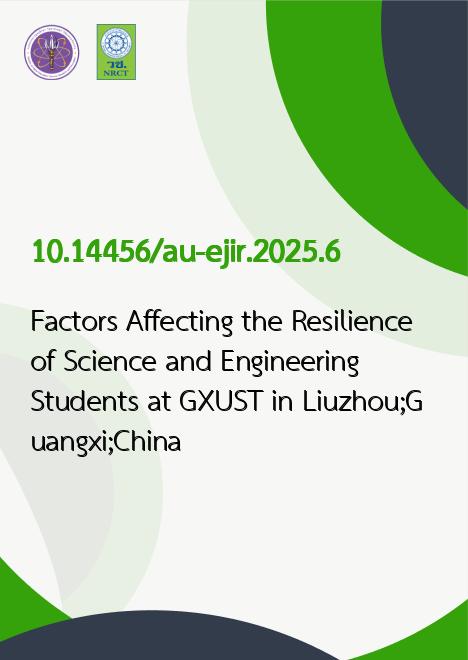
|
Factors Affecting the Resilience of Science and Engineering Students at GXUST in Liuzhou;Guangxi;China |
|---|---|
| รหัสดีโอไอ | |
| Creator | Qianjing Pang |
| Title | 1. Factors Affecting the Resilience of Science and Engineering Students at GXUST in Liuzhou 2. Guangxi 3. China |
| Publisher | Assumption University Press |
| Publication Year | 2568 |
| Journal Title | Journal of Interdisciplinary Research |
| Journal Vol. | 10 |
| Journal No. | 1 |
| Page no. | 55-65 |
| Keyword | Self-efficacy, Optimism, Self-esteem, Physical Exercise, Resilience |
| URL Website | https://assumptionjournal.au.edu/index.php/eJIR/article/view/9033 |
| Website title | JIR |
| ISSN | 2408-1906 |
| Abstract | Purpose: This study examines the impact of four independent variables.self-efficacy; optimism; self-esteem; and physical exercise.on one dependent variable: resilience. The research aims to identify any statistically significant relationships among these variables. Research design; data and methodology: This study assessed validity using the Index of Item-Objective Congruence (IOC) and reliability through a pilot study with 30 participants (Cronbach's Alpha). A multiple linear regression analysis of 302 valid student responses from Guangxi University of Science and Technology examined relationships among variables. Additionally; a 12-week Intervention Design Implementation (IDI) program with 30 students was evaluated using a paired-sample t-test to compare pre- and post-intervention results. Results: Self-efficacy; optimism; self-esteem; and physical exercise significantly influenced resilience in the regression analysis. The paired-sample t-test showed significant improvements in all variables after the IDI program. Conclusions: This study confirms that self-efficacy; optimism; self-esteem; and physical exercise significantly enhance students' resilience; contributing to existing research on psychological resilience in higher education. The effectiveness of the Intervention Design Implementation (IDI) program highlights practical applications for developing targeted interventions to support student well-being. These findings can inform educational policies and mental health strategies aimed at fostering resilience. Future research should explore long-term effects and cross-cultural variations to enhance resilience-building approaches. |